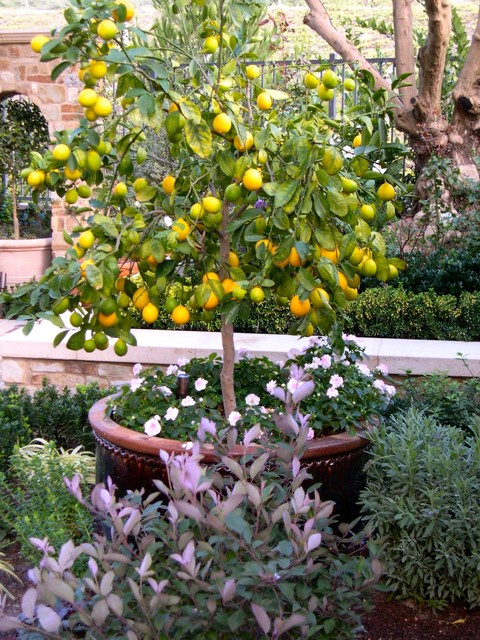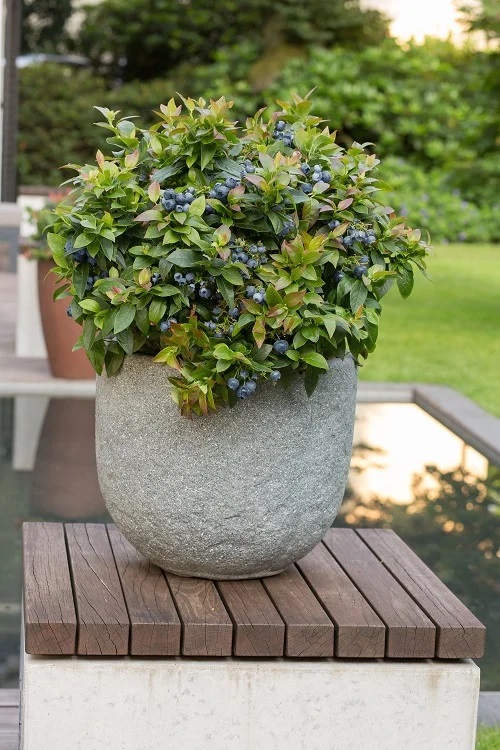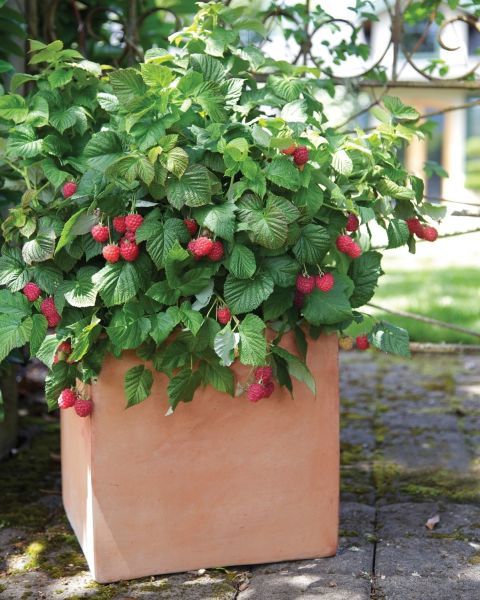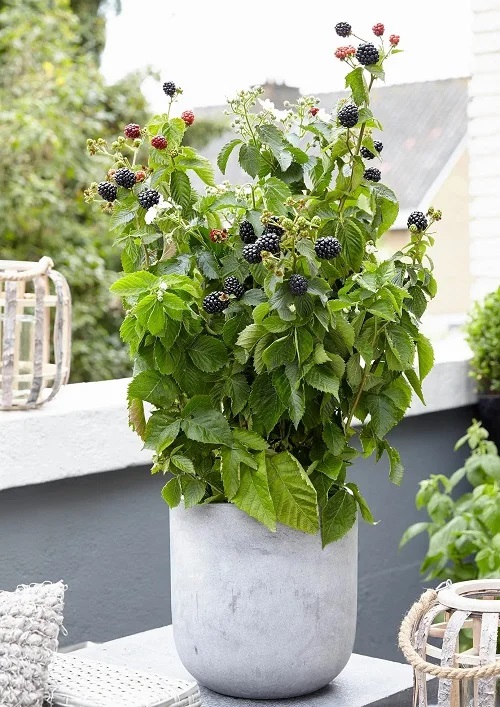Here’s a list of the Best Fruit Trees to Grow in Cold Climates in Pots. Yes! You can enjoy these harvest fruits in small space!
If you live in a chilly weather, then here are the most delicious Fruit Trees to Grow in Cold Climates in Pots you must try!
Check out these Most Strangest Fruits in the World
Some Important Points to Follow While growing Fruit Trees in Containers in Cold Climates
- Container Insulation: Wrap the containers with insulating materials like burlap, bubble wrap, or horticultural fleece to provide protection against freezing temperatures. This helps to maintain stable soil temperatures and prevent root damage.
- Wind Protection: Position the containers in a sheltered location, such as against a wall or near a building, to provide some protection from strong winds. This helps reduce cold drafts that can damage the trees during winter.
- Soil Moisture Management: Keep the soil in the containers moderately moist but not overly wet during winter. Watering should be reduced as the trees enter dormancy, but it’s important to prevent the soil from drying out completely. Check the moisture level periodically and water as needed.
- Mulching: Apply a layer of organic mulch, such as straw or wood chips, around the base of the fruit trees in the containers. Mulch helps insulate the soil, retain moisture, and protect the roots from freezing temperatures.
- Winter Watering: On occasions when the weather is dry during winter and there is no snow cover, provide supplemental watering to ensure the trees receive adequate moisture. This is particularly important for evergreen fruit trees that continue to transpire during the winter months.
- Pruning: Prune the fruit trees in late winter or early spring before new growth emerges. Proper pruning helps shape the trees, remove dead or diseased branches, and improve airflow, reducing the risk of diseases.
- Frost Protection: When frost events are forecasted, cover the fruit trees with frost blankets or sheets to provide temporary protection. This can help prevent frost damage to buds and flowers during early spring.
- Transitioning to Outdoors: When spring arrives and the risk of frost has passed, gradually acclimate the trees to outdoor conditions by exposing them to increasing periods of sunlight and fresh air. This helps the trees adjust to the change in seasons and prevents shock.
Here are Fruits that Stink and Smell
Fruit Trees to Grow in Cold Climates in Pots
1. Apricot
Botanical Name: Prunus armeniaca
USDA Zones: 5-8
Growing apricot in pots is an excellent choice. Cultivars like ‘Moorpark,’ dwarf ‘Puget Gold,’ and semi-dwarf ‘Chinese’ can survive cold temperatures and produce fruit well.
Learn about growing apricot from seeds here
2. Pear Tree

Botanical Name: Pyrus
USDA Zones: 3-10
Select dwarf cold hardy varieties like ‘Moonglow Dwarf Pear Trees’, ‘Max Red Barlett Pear Tree’, ‘Cordon Pear Trees, and Seckel Pears’.
3. Apple
Botanical Name: Malus domestica
USDA Zones: 3-5
If you live in a harsh winter climate, grow varieties like Mclntosh, Sweet Sixteen, Gala, and Honeycrisp are cold hardy.
Learn about Growing Apple Trees in Pots here
4. Cherries
Botanical Name: Prunus avium
USDA Zones: 5-7
While growing cherries in a pot, go for a self-pollinating cultivar such as Morello, Stella, Nabella, Lapins, North Star, Duke, and Sunburst.
Here is How to Grow Barbados Cherry
5. Pomegranate

Botanical Name: Punica granatum
USDA Zones: 7-11
Pomegranate can be easily grown in pots because of its shallow root system. ‘Russian 26’ and ‘Salavatski’ can tolerate temperatures as low as 10 to 15°F (-9 to -12°C).
Here is How to Grow Pomegranate Tree in a Pot & Container
6. Peach
Botanical Name: Prunus persica
USDA Zones: 4-9
Dwarf peach varieties like Madison, Contender, Canadian Harmony, Reliance, Red Haven, and Glohaven are good choices for zone 4.
7. Plum
Botanical Name: Prunus domestica
USDA Zones: 3-8
European plums are an ideal choice for cold climates. American hybrids are cold hardy to zone 3-4 and Japanese plums are hardy to zone 6.
8. Kiwi
Botanical Name: Actinidia chinensis
USDA Zones: 3-9
Select hardy varieties such as baby kiwis for cold areas. Grow the plant in containers and move them to a warm area when the climate turns excessively cold.
Learn more about growing kiwi in a pot here
9. Goji Berries
Botanical name: Lycium Bararum
USDA Zones: 4-9
Goji berries are hardy to -25 F so you can be rest assured that the plant will survive the cold temperature like a champ!
Here is How to Grow Goji Berries
10. Fig
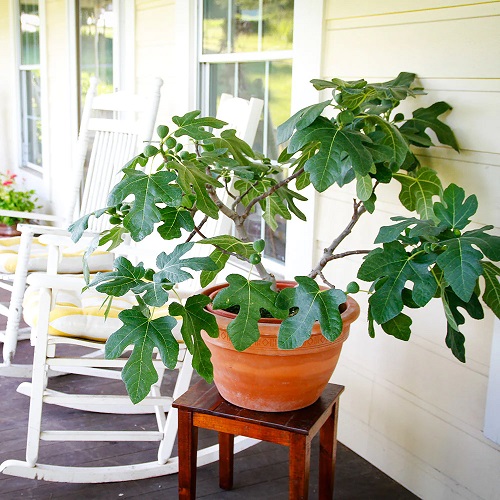
Botanical Name: Ficus carica
Certain fig tree varieties like ‘Brown Turkey’ or ‘Celeste,’ are well-suited for container cultivation and can thrive in colder climates if provided winter protection.
Learn about Growing Umbrella Tree Fig here
11. Dwarf Citrus
Botanical Name: Citrus spp.
USDA Zones: 7-11
Consider dwarf citrus trees like ‘Meyer lemon,’ ‘Calamondin,’ or ‘Kumquat’ that can be grown in containers and brought indoors during winter in colder climates.
Bonus!
While not exactly ‘trees,’ these are great fruits to grow in cold climates in pots!
12. Blueberry
Botanical Name: Vaccinium spp.
USDA Zones: 7-10
Blueberries are well-suited for container gardening. Choose varieties suitable for colder climates, such as ‘Northblue,’ ‘Chippewa,’ or ‘Polaris.’
Here is How to Grow Blueberry in Container
13. Raspberry
Botanical Name: Rubus spp.
USDA Zones: 4-8
Certain raspberry varieties, like ‘Heritage’ or ‘Fall Gold,’ can be grown in containers with proper support and maintenance.
Learn about Growing Raspberry in Pots here
14. Blackberry
Botanical Name: Rubus spp.
USDA Zones: 4-8
Compact blackberry varieties like ‘Baby Cakes,’ ‘Dwarf Thornless Blackberry,’ or ‘Black Satin’ can be container-grown with regular pruning and support.








